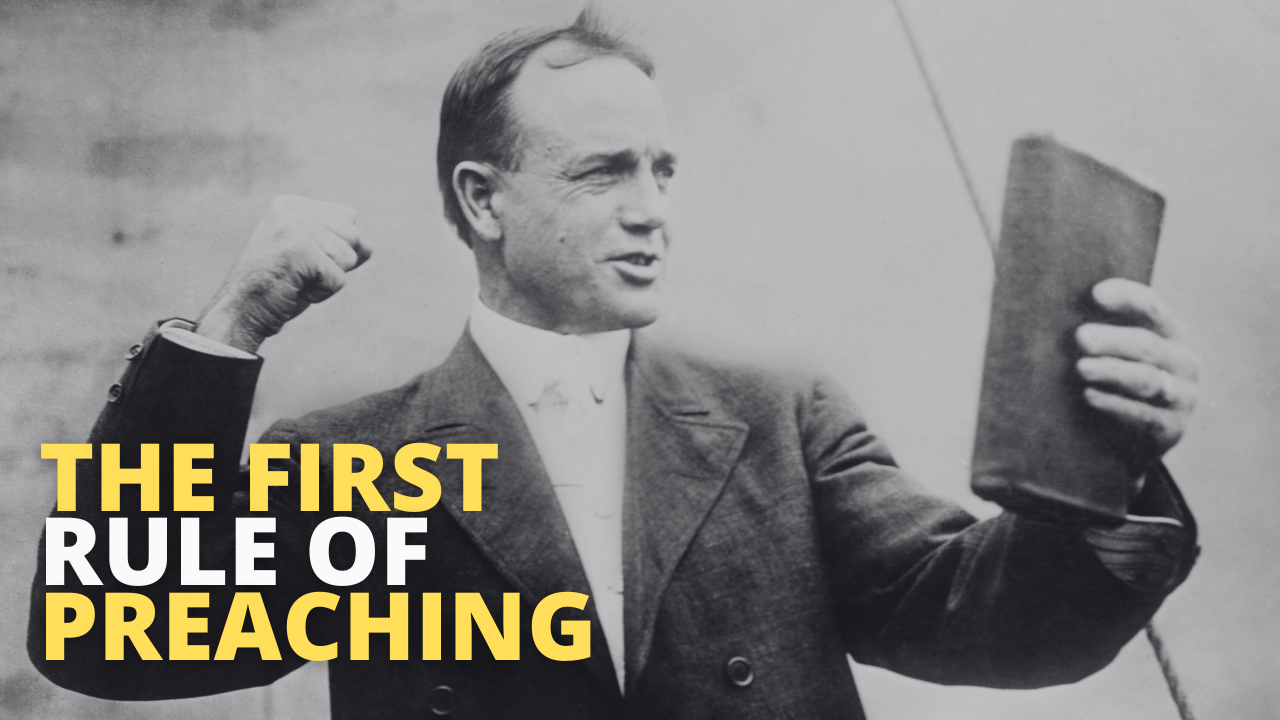The First Rule of Preaching: Preach the Word

On the desk in my office at my Church, I keep an old, orange sticky note where I once scribbled in ink “2 Tim 4:2.” It’s not much to look at, but it is a constant reminder that my primary calling as a pastor is the same as Timothy’s. Paul gives marching orders to his young apprentice in 2 Timothy 4:2, saying, “Preach the word; be ready in season and out of season; reprove, rebuke, and exhort, with complete patience and teaching.”
Faithfully preaching the Word of God is the primary calling of a pastor. While the work of pastoral ministry consists of many other things, none of these duties is more important than preaching the Word.
Why Preach the Word?
We must begin with a healthy theology of the Word of God to understand the primacy of preaching it. The Bible is the inspired Word of God (2 Tim 3:16). Therefore, it carries the divine authority of the Lord Almighty. Since God cannot lie (Titus 1:2), his word is pure (Ps 12:6), permanent (Ps 119:89), perfect (Ps 18:30), and always proves true (Prov 30:5). The Bible is more than merely true; it is truth itself (John 17:17).
In addition, the Word has great power because it is necessary for faith in the gospel (Rom 10:13-17), for growing in spiritual maturity (2 Tim 3:16-17), and for righteous living (Ps 119). Just as we physically starve without food, we starve spiritually without God’s Word (Deut 8:3). Loving God—the greatest commandment according to Jesus (Matt 22:37)—means keeping his commandments in Scripture (1 John 5:3). Obedience to Scripture is obedience to God.
Few things are more frustrating for a pastor than believing it is up to you to save people. It’s a foolish lie that only leads to discouragement and defeat. We have to understand that we have absolutely zero power to save anyone. Saving faith is a gift from God (Eph 2:8) purchased by the blood of Christ (Eph 1:7) that comes by the power of the Holy Spirit (Titus 3:5) working through the preaching of the Word of God (Rom 10:17). So when we preach, we are doing far more than just transferring information to people; we are participating in the work of God through the Word preached to transform people.
However, as we see lives changed and people applaud us for our great sermons, there is a tremendous great danger for preachers to fall into the snare of pride. We must be careful not to take any credit for spiritual transformation, thinking it is through our charisma or eloquent speech. All the power and credit belongs to God. Instead, we must fight the sin of pride to remain humble servants of the Lord, knowing that all the power and glory is God’s alone (Rom 11:36).
Paul sets this example for us, writing, “My speech and my message were not in plausible words of wisdom, but in demonstration of the Spirit and of power, so that your faith might not rest in the wisdom of men but in the power of God” (1 Cor 2:4-5). The only hope we have for the power for people to change from spiritual death to spiritual life is not a charismatic personality, a genius intellect, or a celebrity-like persona. The effectiveness of preaching rests in the power of God through his Word alone.
With all of this in mind, we can see why preaching the Word has historically been the focal point of the church from the beginning. Martyn Lloyd-Jones says, “You cannot read the history of the Church, even in a cursory manner, without seeing that preaching has always occupied a central and a predominating position in the life of the Church.”1
A quick look at the book of Acts tells us as much. On the day of Pentecost in Acts 2, when the Holy Spirit comes upon the disciples, they immediately go out to the streets and preach. As the church grows, the Spirit empowers the disciples to “speak the word of God with boldness” (Acts 4:31). They would preach every day (Acts 5:42). And when complaints arose over the need for better care of widows in the church, the disciples delegated this ministry to others saying, “It is not right that we should give up preaching the word of God to serve tables…. But we will devote ourselves to prayer and to the ministry of the word” (Acts 6:2, 4). This wasn’t because the widows were not important, but because preaching the Word and prayer was of first importance.
As persecution broke out against the church, the result was a spread of preaching as the people scattered (Acts 8:4). And as the church grows, we read, “the word of God increased and multiplied.” (Acts 12:24) and “the word of the Lord continued to increase and prevail mightily (Acts 19:20). In other words, as the Word of God spread, the church grew. Preaching the Word has always had a primary role in the purpose and function of the church, not because the preacher is important, but because the Word of God is supreme.
Some might object that evangelism or discipleship is more important than preaching. While I admire their zeal for discipleship and evangelism, preaching the Word builds the foundation necessary for discipleship and evangelism. Preaching is evangelism in that it ought to always proclaim the good news of the gospel and provide an opportunity to invite people to hear it.
Preaching is also discipleship in that the pastor ought to model what it means to follow Christ and teach the church to be unified in their faith and obedience to God. In addition, as we have seen, preaching the Word helps the church grow in spiritual maturity. It also instructs believers not only to know the Word but also how to study it for themselves so that they can go and evangelize and disciple others.
Preach What The Bible Says
All preachers would benefit from keeping a reminder of 2 Timothy 4:2 to “Preach the word.” And we also should remember that there is more to Paul’s command to Timothy that strengthens these convictions in the next few verses.
For the time is coming when people will not endure sound teaching, but having itching ears they will accumulate for themselves teachers to suit their own passions, and will turn away from listening to the truth and wander off into myths. As for you, always be sober-minded, endure suffering, do the work of an evangelist, fulfill your ministry. (2 Tim 4:3-5)
There are many so-called preachers today who preach things to please itching ears. As a result, many have wandered from the truth. So the charge for all pastors is to be faithful preachers of the Word so that, like Paul, though we may endure hardship, we will be faithful to the work of ministry we have been called to fulfill.
- Lloyd-Jones, D. Martyn; Lloyd-Jones, D. Martyn. Preaching and Preachers (pp. 18-19). Zondervan. Kindle Edition. ↩︎





Indeed Biblical preaching is preaching the Word. Thank you very much for this powerful teaching.
Powerful and profound teaching.
I love preaching but i am not the Pastor, i am a born again believer who love the Lord with all my heart with all my soul with all my strength and with all my mind. I am so blessed to be in connection with such a powerful ministry with powerful teachings. Amen.
Well said